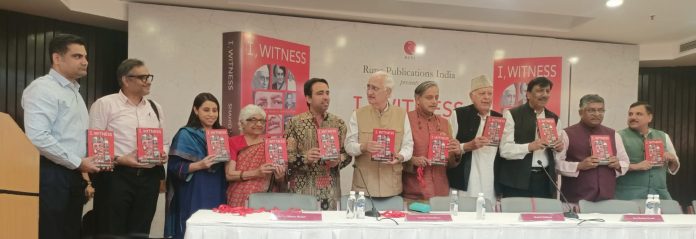– Mohd Naushad Khan
New Delhi: A powerful literary evening unfolded at the India International Centre as veteran journalist, former MP, and author Shahid Siddiqui launched his much-awaited memoir I, Witness. The book, dedicated to “Mother India,” traces his journey through journalism, politics, encounters with leaders, and his pursuit of truth.
Siddiqui said the book is not an autobiography but a memoir. “It is about incidents I witnessed, people I met, and lessons I learned,” he explained. He stressed that memoirs are vital for historians and scholars. “In the West, political memoirs are tradition. In India, they often serve vested interests. My aim was honesty—towards my nation, culture, and community,” he said.
Recalling his early years, he said he chose Urdu journalism despite better prospects in English. For him, Urdu was a bridge to Muslims left “rudderless after Partition.” He believed their hearts could be reached better in their own language.
From Nai Duniya to interviews with leaders like Indira Gandhi and the Hindu Parishad, Siddiqui built a reputation for fearless journalism. He faced political pressure, imprisonment under TADA, and threats abroad. He remembered the words of his teacher, Prof. Avdey Singh: “Neutrality is a sin. One must be honest and take a stand.”
Siddiqui admitted he never saw himself as a “successful politician.” He took pride in being a journalist who questioned power. I, Witness is, he said, his honest gift to society and history.
Prof. Hilal Ahmed of CSDS said the book can be read in three ways—“as India’s story, as a personal-political account, and as political theory.” He said it historicizes events, interprets Indian history through constitutional discourse, and presents a theory of India as “a land of minorities.” It also highlights the politics of emotions, forgetting, and the dependence of democracy on the Constitution.
Senior journalist Neerja Chowdhury said memoirs by journalists are unique as they combine ground experience with perspective. She called I, Witness a much-needed blend of memoir and history. She noted Siddiqui’s rare view of politics, from his childhood moments with leaders like G.B. Pant and Nehru, to interviews with Indira Gandhi, Vajpayee, and Narendra Modi. She praised his ethics, recalling how he refused political gain when pressured not to publish his Modi interview. “His concern for Muslim education and livelihoods goes beyond vote-bank politics,” she said.
Former Union Minister Salman Khurshid shared how Siddiqui was jailed under TADA for publishing Khalistan-linked views. He recalled telling the court that Siddiqui was interviewing Rajiv Gandhi at the same time. The judge laughed and released him. Khurshid also remembered Siddiqui’s role in the AICC Minority Department. He said the Congress might not have lost good people like him if the party had better communication.
Former J&K Chief Minister Farooq Abdullah spoke on bonds between Hindus and Muslims before Partition. Families shared homes during festivals and weddings, he recalled. He called Partition a British-inflicted tragedy. He urged mutual survival, warning against division. Comparing India with China, he said India must rediscover compassion and humanity. “India must rise as a power of humanity,” he prayed.
Former Union Law Minister Ravi Shankar Prasad shared stories of his long friendship with Siddiqui. He recalled their visit to Pakistan, where even elites had to turn to ISI for justice. He contrasted this with India’s democracy and praised Siddiqui for documenting it. He also recalled Siddiqui’s father, a Deobandi scholar, who spoke bravely for communal harmony during the Emergency.
I, Witness captures India’s triumphs, traumas, and contradictions. It positions Siddiqui not only as a chronicler but also as a participant in shaping modern India.
The event ended with reflections moderated by journalist Marya Shakil, who steered the discussion with balance.




